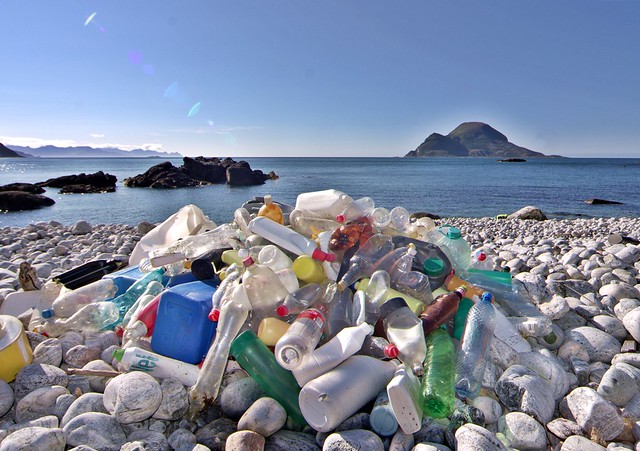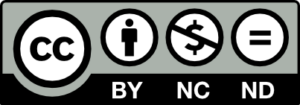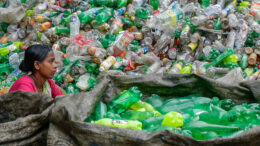The fourth session of the United Nations Environment Program’s Intergovernmental Negotiating Committee on Plastic Pollution, held in April in Ottawa, was intended to address one of the most pressing, widespread pollution problems of our time. But the influence of fossil fuel and chemical industries on the meetings stymied progress on efforts to protect human health and the natural world.
In seeking to disrupt meaningful progress to tackle plastic pollution, lobbyists used the same playbook as the thousands of fossil fuel lobbyists whose presence has become routine at critical global environmental conferences. At the most recent climate CoP in Dubai, for instance, the fossil fuel industry bloc was bigger than any country’s delegation save Brazil and the UAE.
In Ottawa industry exerted its power in numbers, but also in its infiltration of high-level meetings. Sixteen lobbyists registered across nine different country delegations, giving them access to Member State-only sessions and influence in key negotiations. In other meetings, some lobbyists adopted an aggressive approach, with independent scientists from the Scientists’ Coalition reporting acts of intimidation and harassment to the U.N.
Various oil-producing states fortified industry efforts by working to water down the ambition of the treaty. Certain states, including Saudi Arabia, India, Kuwait and Qatar, reportedly attempted to undermine the progress already made on definitions in the hope of restricting the scope of a full lifecycle of plastics to waste alone.

Plastic production has increased nearly 230-fold in the past 70 years, with this persistent, mostly petrochemical-based material now found in ecosystems across the globe and the bodies of countless species, including our own. Fossil fuel and chemical companies have invested billions of dollars into large-scale plastic production projects over the last decade.
As a result, a staggering 196 fossil fuel and chemical industry lobbyists signed up for the most recent round of meetings in Ottawa, a 37% increase since the third wave of negotiations at the end of 2023. Their group was seven times larger than the Indigenous Peoples Caucus and three times larger than the Scientists’ Coalition for an Effective Plastic Treaty.
This power imbalance makes it all the more unjust that industry crowded out the voices of those most affected by plastic pollution. Despite ambitious efforts by states such as Rwanda and Peru, tactics of deliberate obstruction and delay by vested interests resulted in a draft text muddled with uncertainties. Proposed intersessional work also fails to address the critical issue of primary plastic polymer production and makes the role of observers — including frontline communities and Indigenous people — unclear.
With no first draft of the Global Plastics Treaty decided, lobbyists and oil-producing states continue to protect their right to produce plastic without cleaning it up — and communities around the world remain burdened by an escalating waste crisis.
It is patently obvious that progress is more difficult, if not impossible, when those profiting from the planetary emergency enjoy so much influence over how — and whether — we address it. The industry lobby too often gains a preferential platform due to its vast funds and position in government backrooms, and that needs to end.
Only complete transparency in international environmental conferences stands a chance of making a dent. Progress has been made by the U.N. in disclosing affiliations, but this remains largely voluntary and lacks the strength needed to end industry’s undue influence.
Ahead of the next session of the UNEP’s INC on plastics, scheduled to take place from Nov. 25 to Dec. 1, 2024, in Busan, Republic of Korea, the U.N. should implement its own version of the OECD recommendations on transparency in lobbying. This should include full disclosure of all lobbying and influence activities, producing a clear footprint of who lobbyists represent, how and what they are paid, and who they meet. To prevent industry lobbyists from dominating negotiations, there should also be a more selective process for assigning conference presidencies and sponsorships, and industry stakeholders should be banned from official delegations.
Vitally, we must prioritize the involvement of frontline groups such as Indigenous peoples and communities in the Global South. Representatives from some of the hardest-hit places often struggle to acquire badges and secure funding for travel and accommodation; often they can’t even access key negotiations. Their presence at conferences and access to the higher levels of negotiations must be guaranteed.
To secure a stable climate, protect global biodiversity, and support human health, we cannot delay systemic change any longer. We’re at a breaking point: Plastics are found from the deepest ocean to the highest peak; we’re set to blow past the targets of the Paris Agreement; and the U.N. has repeatedly sounded the alarm that the next few years will make or break our chances of a sustainable future.
The opinions expressed above are those of the author and do not necessarily reflect those of The Revelator, the Center for Biological Diversity or their employees.



